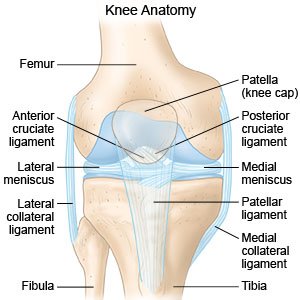Posterior Cruciate Ligament Injury
Medically reviewed by Drugs.com. Last updated on Jul 7, 2024.
A posterior cruciate ligament (PCL) injury is a partial or complete tear of the ligament in the back of your knee. The PCL connects the tibia (shin bone) to the femur (thigh bone). The PCL stops the tibia from sliding too far backward or forward and keeps the knee stable.
 |
WHILE YOU ARE HERE:
Informed consent
is a legal document that explains the tests, treatments, or procedures that you may need. Informed consent means you understand what will be done and can make decisions about what you want. You give your permission when you sign the consent form. You can have someone sign this form for you if you are not able to sign it. You have the right to understand your medical care in words you know. Before you sign the consent form, understand the risks and benefits of what will be done. Make sure all your questions are answered.
Medicines:
- NSAIDs , such as ibuprofen, help decrease swelling, pain, and fever. NSAIDs can cause stomach bleeding or kidney problems in certain people. If you take blood thinner medicine, always ask your healthcare provider if NSAIDs are safe for you. Always read the medicine label and follow directions.
- Prescription pain medicine may be given. Ask your healthcare provider how to take this medicine safely. Some prescription pain medicines contain acetaminophen. Do not take other medicines that contain acetaminophen without talking to your healthcare provider. Too much acetaminophen may cause liver damage. Prescription pain medicine may cause constipation. Ask your healthcare provider how to prevent or treat constipation.
Physical therapy
may recommended. A physical therapist can teach you exercises to increase strength, flexibility, and range of motion.
Tests:
- An x-ray or MRI may be used to look for a PCL tear. You may be given contrast liquid to help the PCL show up better in pictures. Do not enter the MRI room with anything metal. Metal can cause serious injury. Tell the healthcare provider if you have any metal in or on your body.
- Arthroscopy is a procedure used to look inside your knee for a PCL injury. A small incision is made in your knee and a scope is inserted. The scope is a long, bendable tube with a camera and light on the end.
Treatment:
You may need surgery if you have a severe tear and other injuries. This may include injuries to other ligaments, a broken bone, or a cartilage (shock absorbers between knee bones) tear. A PCL tear may be repaired by reattaching the torn ligament. You may need reconstruction if your PCL cannot be repaired. Your PCL can be replaced with tissue taken from another part of your body, or from a donor.
RISKS:
Repeated injuries to your PCL can cause long-term damage. This can lead to a weak, unstable knee, even during normal activities. You may feel your knee give way more often. When the PCL is injured, other ligaments of the knee may also be affected. One or more of the menisci (cartilage shock absorbers between knee bones) may also be damaged. Injury to the PCL may cause the ligament to pull off a part of the shin bone. Even with treatment, the knee may not be the same as it was before the injury.
CARE AGREEMENT:
You have the right to help plan your care. Learn about your health condition and how it may be treated. Discuss treatment options with your healthcare providers to decide what care you want to receive. You always have the right to refuse treatment.© Copyright Merative 2024 Information is for End User's use only and may not be sold, redistributed or otherwise used for commercial purposes.
The above information is an educational aid only. It is not intended as medical advice for individual conditions or treatments. Talk to your doctor, nurse or pharmacist before following any medical regimen to see if it is safe and effective for you.
Learn more about Posterior Cruciate Ligament Injury
Care guides
Further information
Always consult your healthcare provider to ensure the information displayed on this page applies to your personal circumstances.
